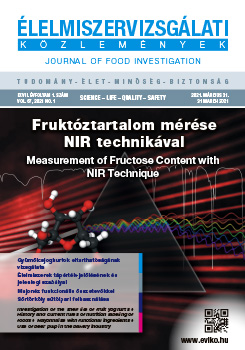Investigation of the shelf life of fruit yogurts as a function of the treatment of flavoring substances
Main Article Content
Abstract
Milk and dairy products represent one of the foundations of the human diet because of their valuable ingredients and pleasant sensory properties. The aim of our research was to investigate how different heat treatment processes (microwave irradiation, drying) affect the shelf life of dairy products (yogurt) from a microbiological point of view. In the course of our measurements, the effects of the different heat treatment parameters of the flavoring substances used in the production of the products (apples, bananas) on the microbiological properties of the products and, thus, on their shelf life were investigated. In our experiments, conventional drying (55 °C, 24 hours) and microwave irradiation technology (800 W, 55 °C, 10 min) were used as treatment forms of the additives. Comparisons were made in terms of microbiological parameters (total viable count, yeast/mold count and E. coli/coliform count). Based on our results, we believe that the drying process can ensure microbiological safety in food production if the air circulating in the equipment has adequate hygienic properties. The microwave irradiation technology can be used successfully to inhibit microbes in foods, in this case fruits. However, the same treatment parameters cannot be applied to different fruits.

